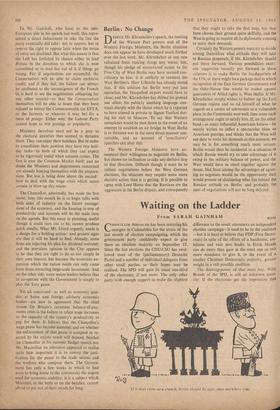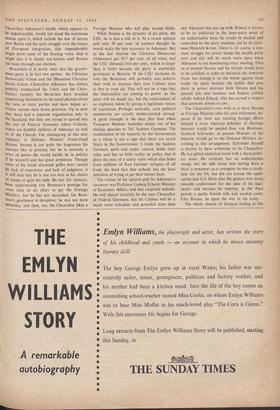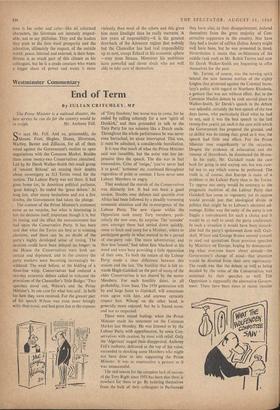Waiting on the Ladder
From SARAH GAINHAM BONN CtIANCELLOR ADENAUER has been restoring his energies in Cadenabbia for the strain of the last month of election campaigning, which the government party confidently expect to give them an absolute majority on September 17. Since the last elections the CDU-CSU has swal- lowed most of the (parliamentary) Deutsche Partei and a number of individual delegates from other small parties, so their hopes may be realised. The SPD will gain its usual one-third of the electorate, if not more. The only other party with enough support to make the slightest difference to the result announces an independent election campaign—it used to be in the coalition —but it is hard to believe that FDP (Free Demo- crats) in spite of the efforts of a handsome, am- bitious and vain new leader in Erich Mende can do more than gain at the most one or two more mandates to give it, in the event of a smaller Christian Democratic majority, greater weight in a still possible coalition.
The drawing-power of that mere boy, Willy Brandt of the SPD, is still an unknown quan- tity. If the electorate got the impression that Chancellor Adenauer's health, which appears to be indestructible, would not stand the enormous Strains upon it, which include the war of nerves over Berlin and the quiet struggle over the future of European integration, that imponderable might draw some of the floating votes. And it might not; it is simply not known until Brandt has been through one election.
Meanwhile it is newbf clear that the govern- ment party is in fact two parties: the Christian Democratic Union and the (Bavarian) Christian Social Union. Chancellor Adenauer has always Publicly emphasised the Unity and the Chris- tianity; recently the Bavarians have avoided committing themselves to the usual phrases about the twin or sister parties and have begun ac- tivities outside their home province. Up to now they have had a separate organisation only in the Saarland, but they are trying to spread into the rest of Federal Germany where Catholic voters are faithful children of Adenauer as well as of the Church. The mainspring of this new tendency is Defence Minister Franz-Josef Strauss. Strauss is not quite the bogeyman his enemies like to pretend, but he is certainly a lover of. power (he would hardly be in politics if he weren't) and has great ambitions. Though some of his much discussed gaffes were caused by lack of experience and lack of judgment, it is still true that he is not too nice in his choice of means to gain his ends. He has, for instance, been undermining von Brentano's prestige for some time in an effort to get the Foreign Ministry; but he has not succeeded, for Bren- tano's gentleness is deceptive; he was not born Yesterday, and then, too, the Chancellor likes a Foreign Minister who will play second fiddle.
While Strauss is the dynamo of his party, the CSU, he is also a risk to it. At a recent opinion poll only 30 per cent. of answers thought he would make the best successor to Adenauer. But at the last election the Christian Democrats (Adenauer) got 39.7 per cent. of all votes, and the CSU (Strauss) 10.6 per cent., which is larger than it looks because the party is essentially provincial to Bavaria. If the CSU increases its vote the Bavarians will probably also achieve their wish to increase their four Cabinet seats to five or even six. This will not be a sign that the Nationalists are coming to power, as the press will no doubt say, but the containment of an explosive talent by giving it legitimate means of expression. Perhaps, naturally, such political manoeuvres are usually misinterpreted abroad. A good example is the dust that rises when Transport Minister Seebohm makes one of his ranting speeches to 'his' Sudeten Germans. The condonation of his hysteria by the Government as a whole is not a sign that there are secret Nazis in the Government; it keeps the Sudeten Germans quiet and under control, holds their votes and has so little reality as policy that it plays the part of a safety valve which also hides from millions of East German refugees of all kinds the hard fact that nobody has the least intention of trying to get their homes back.
The winner of the opinion poll for Adenauer's successor was Professor Ludwig Erhard, Minister of Economic Affairs, and that surprised nobody. He will almost certainly be the next Chancellor of Federal Germany, but his Cabinet will be a much more articulate and powerful team than any Adenauer has put up with. Erhard is known to be no politician in the inner-party sense of an authoritative boss; he would be backed and controlled by the party machine, led by its chair- man Heinrich Krone. There is, of course, a con- stant struggle for power inside the double party now and this will be much more open when Adenauer is not dominating every meeting. Then as at present Strauss and his friends would have to be satisfied in order \to maintain the common front, but feeling is on the whole against them inside the party because the public that puts them in power distrusts both Strauss and his present job, and business and finance remain solidly behind Erhard, who has earned a respect that amounts almost to awe.
The Chancellor's own wish is to have Strauss as Foreign Minister after his own retirement, be- cause if he were not running foreign, affairs himself a more vigorous defender of German interests would be needed than von Brentano. Gerhard Schroeder, at present Minister of the Interior, would go to the Defence Ministry ac- cording to this arrangement. Schroeder himself is known to have ambitions to be Chancellor. He is,a gifted analytical brain with a sharp politi- cal sense. He certainly has an authoritarian streak, but the talk about him having been a Nazi is nonsense; as a youngster he was a candi- date for the SA, but did not pursue the appli- cation and it is likely that the gesture was madQ. towards conformism for the sake of his lega; career and because he married, in the Nazi period, a partly Jewish wife and needed cover. Like Strauss, he spent the war in the army.
The whole climate of German feeling at this time is for order and calm—like all reformed characters, the Germans are intensely respect- able, not to say philistine. They and the leaders they push to the fore want prosperity and the toleration, ultimately the respect, of the outside world; peace, internal and external, is their hope. Strauss is as much part of this climate as his colleagues, but he is a crude creature who wants a bigger share of power and wants it more violently than most of the others and this gives him more limelight than he really warrants. A few years of responsibility—it is the greatest drawback of the Adenauer regime that nobody but the Chancellor has had real responsibility up to now, except Erhard in his economic sphere —may tame Strauss. Moreover his ambitions have powerful and clever rivals who are well able to take care of themselves.
































 Previous page
Previous page